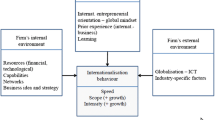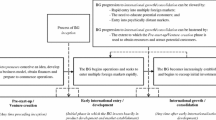Abstract
This paper extends current understanding on international growth process of born global firms from the perspective of strategic decision-making. The data were collected from three software companies in Finland, Ireland and Israel both in real-time and retrospectively, and data triangulation was employed to increase the validity of the findings. With a longitudinal approach, we captured the dynamics of the post-entry international growth process and the critical events that act as decision-making triggers. The decision-making of born global firms seems to be characterised by alternating periods of causation- and effectuation-based logics. Triggers for amending the logic include, for example, change of key persons and the search for external funding. Co-existence of the two decision-making logics is possible, due to different degrees of uncertainty in market and technology or multiple decision-makers involved. The contribution of the study is threefold: first, it addresses gaps in international entrepreneurship research by describing how born global firms make strategic decisions and who are involved in the decision-making. Second, it identifies critical incidents which trigger a change in the decision-making process of a born global firm. Third, it provides alternative insights to why decision-making logic may change or why two decision-making logics may co-exist.

Similar content being viewed by others
References
Almor, T. (2011). Dancing as fast as they can: Israeli high-tech firms and the great recession of 2008. Thunderbird International Business Review, 53(2), 195–208.
Andersson, S. (2011). International entrepreneurship, born globals and the theory of effectuation. Journal of Small Business and Enterprise Development, 28(3), 627–643.
Autio, E., George, G., & Alexy, O. (2011). International entrepreneurship and capability development: qualitative evidence and future research directions. Entrepreneurship Theory and Practice, 35(1), 11–37.
Bourgeois III, L. J., & Eisenhardt, K. M. (1988). Strategic decision processes in high velocity environments: four cases in the microcomputer industry. Management Science, 34(7), 816–835.
Cavusgil, S. T., & Godiwalla, Y. M. (1982). Decision-making for international marketing: a comparative review. Management Decision, 20(4), 47–54.
Chandler, G. N., DeTienne, D. R., McKelvie, A., & Mumford, T. V. (2011). Causation and effectuation processes: a validation study. Journal of Business Venturing, 26(3), 375–390.
Chandra, Y., Styles, C., & Wilkinson, I. (2009). The recognition of first time international entrepreneurial opportunities: evidence from firms in knowledge-based industries. International Marketing Review, 26(1), 30–61.
Chetty, S., & Campbell-Hunt, C. (2004). A strategic approach to internationalisation: a traditional versus ‘born global’ approach. Journal of International Marketing, 12(1), 57–81.
Child, J., & Hsieh, L. H. Y. (2014). Decision mode, information and network attachment in the internationalization of SMEs: a configurational and contingency analysis. Forthcoming in Journal of World Business. doi:10.1016/j.jwb.2013.12.012.
Dew, N., Read, S., Sarasvathy, S. D., & Wiltbank, R. (2009). Effectual versus predictive logics in entrepreneurial decision-making: differences between experts and novices. Journal of Business Venturing, 24(4), 287–309.
Dimitratos, P., Petrou, A., Plakoyiannaki, E., & Johnson, J. E. (2011). Strategic decision-making processes in internationalization: does national culture of the focal firm matter? Journal of World Business, 46(2), 194–204.
Eisenhardt, K. M. (1989). Building theories from case study research. Academy of Management Review, 14(4), 532–550.
Eisenhardt, K. M., & Graebner, M. E. (2007). Theory building from cases: opportunities and challenges. Academy of Management Journal, 50(1), 25–32.
Eisenhardt, K. M., & Zbaracki, M. J. (1992). Strategic decision making. Strategic Management Journal, 13(S2), 17–37.
Eurofound. (2012). Born global: the potential of job creation in new international businesses. Luxembourg: Publications Office of the European Union.
Evers, N., & O’Gorman, C. (2011). Improvised internationalization in new ventures: the role of prior knowledge and networks. Entrepreneurship & Regional Development, 23(7–8), 549–574.
Fisher, G. (2012). Effectuation, causation, and bricolage: a behavioral comparison of emerging theories in entrepreneurship research. Entrepreneurship Theory and Practice, 36(5), 1019–1051.
Flanagan, J. C. (1954). The critical incident technique. Psychological Bulletin, 51(4), 327–358.
Gabrielsson, P., & Gabrielsson, M. (2013). A dynamic model of growth phases and survival in international business-to-business new ventures: the moderating effect of decision-making logic. Industrial Marketing Management, 42(8), 1357–1373.
Gabrielsson, M., & Kirpalani, M. K. (2004). Born globals: how to reach new business space rapidly. International Business Review, 13(5), 555–571.
Gabrielsson, M., Kirpalani, V. H. M., Dimitratos, P., Solberg, C. A., & Zucchella, A. (2008). Born globals: propositions to help advance the theory. International Business Review, 17(4), 385–401.
Galkina, T., & Chetty, S. (2012). Effectuation and networking of internationalizing SMEs. Paper presented at the 54th AIB Annual Meeting. Washington, DC.
Ghauri, P. (2004). Designing and conducting case studies in international business research. In R. Marschan-Piekkari & C. Welch (Eds.), Handbook of qualitative research methods for international business (pp. 109–124). Cheltenham: Edward Elgar.
Harms, R., & Schiele, M. (2012). Antecedents and consequences of effectuation and causation in the international new venture creation process. Journal of International Entrepreneurship, 10(2), 95–116.
Hashai, N., & Almor, T. (2004). Gradually internationalizing ‘born global’ firms: an oxymoron? International Business Review, 13(4), 465–483.
Huber, G. P., & Power, D. J. (1985). Retrospective reports of strategic-level managers: guidelines for increasing their accuracy. Strategic Management Journal, 6(2), 171–180.
Jantunen, A., Nummela, N., Puumalainen, K., & Saarenketo, S. (2008). Strategic orientations of born globals: do they really matter? Journal of World Business, 43(1), 158–170.
Jones, M. V., & Coviello, N. E. (2005). Internationalisation: conceptualising an entrepreneurial process of behaviour in time. Journal of International Business Studies, 36(3), 284–303.
Jones, M. V., Coviello, N., & Tang, Y. K. (2011). International Entrepreneurship research (1989–2009): a domain ontology and thematic analysis. Journal of Business Venturing, 26(6), 632–659.
Kalinic, I., Sarasvathy, S., & Forza, C. (2014). Expect the unexpected: implications of effectual logic on the internationalization process. Forthcoming in International Business Review. doi:10.1016/j.ibusrev.2013.11.004.
Keupp, M. M., & Gassmann, O. (2009). The past and the future of international entrepreneurship: a review and suggestions for developing the field. Journal of Management, 35(3), 600–633.
Kuivalainen, O., Saarenketo, S., & Puumalainen, K. (2012). Start-up patterns of internationalization: a framework and its application in the context of knowledge-intensive SMEs. European Management Journal, 30(4), 372–385.
Liesch, P. W., Welch, L. S., & Buckley, P. J. (2011). Risk and uncertainty in internationalisation and international entrepreneurship studies: review and conceptual development. Management International Review, 51(6), 851–873.
Luostarinen, R. (1979). Internationalization of the Firm. Acta Academiae Oeconomicae Helsingiensis, Series A:30. Helsinki: Helsinki School of Economics.
Madsen, T. K. (2013). Early and rapidly internationalizing ventures: similarities and differences between classifications based on the original international new venture and born global literatures. Journal of International Entrepreneurship, 11(1), 65–79.
Madsen, T. K., Rasmussen, E., & Servais, P. (2000). Differences and similarities between born globals and other types of exporters. Advances in International Marketing, 10, 247–265.
Mainela, T., & Puhakka, V. (2009). Organising new business in a turbulent context: opportunity discovery and effectuation for IJV development in transition markets. Journal of International Entrepreneurship, 7(2), 111–134.
Mathews, J. A., & Zander, I. (2007). The international entrepreneurial dynamics of accelerated internationalization. Journal of International Business Studies, 38(3), 387–403.
Miles, M. B., & Huberman, A. M. (1994). Qualitative data analysis: an expanded sourcebook. Thousand Oaks: Sage.
Mudambi, R., & Zahra, S. A. (2007). The survival of international new ventures. Journal of International Business Studies, 38(7), 333–352.
Nemkova, E., Souchon, A. L., & Hughes, P. (2012). Export decision-making orientation: an exploratory study. International Marketing Review, 29(4), 349–378.
Oviatt, B. M., & McDougall, P. P. (2005). Defining international entrepreneurship and modeling the speed of internationalization. Entrepreneurship Theory & Practice, 29(5), 537–553.
Perry, J., Chandler, G. N., & Markova, G. (2012). Entrepreneurial effectuation: a review and suggestions for future research. Entrepreneurship Theory and Practice, 36(4), 837–861.
Rialp, A., Rialp, J., & Knight, G. A. (2005). The phenomenon of early internationalizing firms: what do we know after a decade (1993–2003) of scientific inquiry? International Business Review, 14(2), 147–166.
Rialp-Criado, A., Galvan-Sanchez, I., & Suarez-Ortega, S. M. (2010). A configuration-holistic approach to born global firms’ strategy formation process. European Management Journal, 28(2), 108–123.
Salmi, A. (2010). International research teams as analysts of industrial business networks. Industrial Marketing Management, 39(1), 40–48.
Sarasvathy, S. D. (2001). Causation and effectuation: toward a theoretical shift from economic inevitability to entrepreneurial contingency. Academy of Management Review, 26(2), 243–288.
Sarasvathy, S. D. (2004). Making it happen: beyond theories of the firm to theories of firm design. Entrepreneurship Theory and Practice, 28(6), 519–531.
Sarasvathy, S., Kumar, K., York, J. G., & Bhagavatula, S. (2014). An effectual approach to international entrepreneurship: overlaps, challenges, and provocative possibilities. Entrepreneurship Theory & Practice, 38(1), 71–93.
Schweizer, R. (2012). The internationalization process of SMEs: a muddling-through process. Journal of Business Research, 65(6), 745–751.
Schweizer, R., Vahlne, J.-E., & Johanson, J. (2010). Internationalization as an entrepreneurial process. Journal of International Entrepreneurship, 8(4), 343–370.
Spence, M., & Crick, D. (2006). A comparative investigation into the internationalization of Canadian and UK high-tech SMEs. International Marketing Review, 22(5), 524–548.
Terjesen, S., Hessels, J., & Li, D. (2013). Comparative international entrepreneurship: a review and research agenda. Forthcoming in Journal of Management. doi:10.1177/0149206313486259.
Thai, M. T. T., & Chong, L. C. (2013). Dynamic experimental internationalization: strategy of SMEs from a transition economy. Journal of International Entrepreneurship, 11(4), 370–399.
Tsang, E. W. K. (2014). Generalizing from research findings: the merits of case studies. Forthcoming in International Journal of Management Reviews. doi:10.1111/ijmr.12024.
Tsui, A. S. (2004). Contributing to global management knowledge: a case for high quality indigenous research. Asia Pacific Journal of Management, 21(4), 491–513.
von Hippel, E. (2005). Democratizing innovation. Cambridge: MIT Press.
Weick, K. E. (1979). The social psychology of organizing (2nd ed.). Reading: Addison Wesley.
Yin, R. K. (2009). Case study research, design and methods. Thousand Oaks: Sage.
Author information
Authors and Affiliations
Corresponding author
Rights and permissions
About this article
Cite this article
Nummela, N., Saarenketo, S., Jokela, P. et al. Strategic Decision-Making of a Born Global: A Comparative Study From Three Small Open Economies. Manag Int Rev 54, 527–550 (2014). https://doi.org/10.1007/s11575-014-0211-x
Received:
Revised:
Accepted:
Published:
Issue Date:
DOI: https://doi.org/10.1007/s11575-014-0211-x




